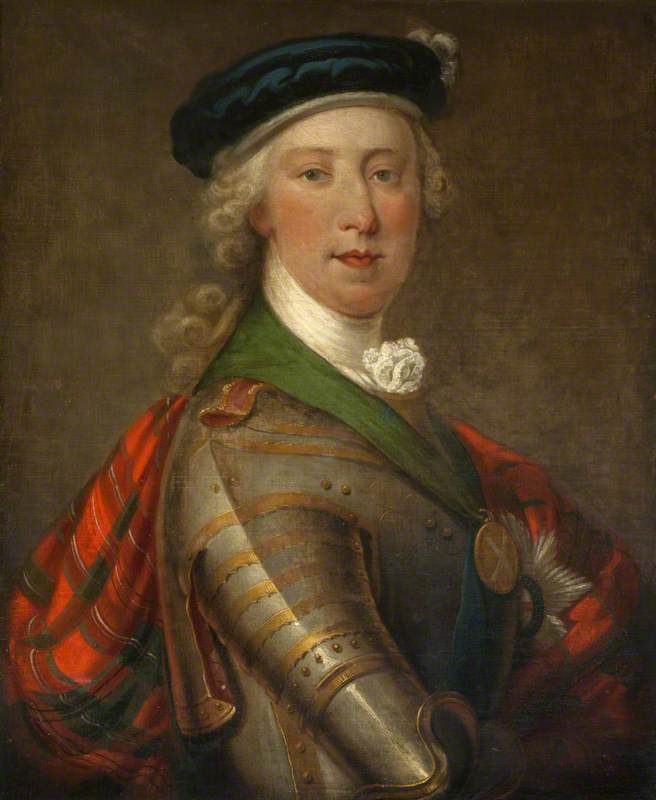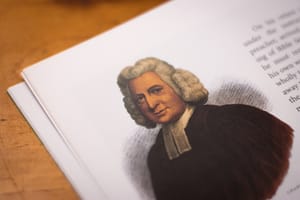James Gardiner was born near Edinburgh in 1688. His pious mother and aunt instructed him in the Christian faith but no impression was made upon him. He lived for adventure and later for illicit romance. At the age of twelve he joined the army and two years later was fighting in Holland under Marlborough. During the battle of Ramillies, he came very close to death. He was in a group of men trying to dislodge the French from a churchyard, when a musket-ball went in through his mouth and out through his neck. At first he felt no pain and groped around with his finger to see if he had swallowed the musket-ball. With his finger he finally traced the path of the bullet through to its exit hole and then collapsed from blood loss. As he lay on the ground his one concern was for his gold. Taking a lump of clotted blood from his mouth he mixed it in with the money in his hand and cemented it closed. Such were his priorities.
A remarkable conversion
Gardiner was repatriated to England. He continued as a soldier and gained rapid promotion. In 1719 he accompanied the English ambassador, the Earl of Stair, to France. There the tall, handsome officer took full advantage of the lewdness of the Parisian court. The next few years were the most dissolute of Gardiner’s life.

One night, in July 1719, he was waiting to keep a midnight rendezvous with a married woman. He had an hour to kill and picked up a book that his mother had slipped into his baggage. It was The Christian Soldier by the Puritan Thomas Watson, and he began to read. What happened next remains deeply mysterious, and throughout his life Gardiner was reluctant to speak in detail about it. As he was reading he thought he saw a bright light fall upon the book. Thinking it was an effect of the candlelight, he raised his eyes. To his astonishment he was gazing at a vision of the Lord Jesus Christ upon the cross. The vision was surrounded on all sides with glory, and a voice seemed to say, ‘O sinner, did I suffer all this for thee, and are these the returns?’
All memory of his midnight assignment was gone as he came under deep conviction of sin. He was convinced that he deserved eternal damnation and yet what he felt, above all, was shame for his ingratitude to Christ. What broke his heart was the work of Christ on the cross to save sinners, rather than the threat of divine punishment. Two months later he was given powerful assurance that God had accepted him in Christ. This assurance came through the words of Scripture: ‘Christ Jesus: whom God hath set forth to be a propitiation through faith in his blood, to declare his righteousness for the remission of sins’ (Romans 3:25-26). He continued as a zealous and devout Christian until his death twenty-six years later.

Bold witness
Gardiner would regularly spend from 4.00 till 6.00a.m. in prayer and Bible reading, even when on active military service. He rebuked swearing whether in humble soldiers or elevated nobles, and seemed to manage to do so without causing offence. He mixed in high society and had audiences with the Prince and Princess of Wales. When he first returned to England, he became aware of a rumour that he had gone stark mad. So he persuaded an eminent friend to arrange a dinner party for him and his former friends, to whom he then gave his testimony at length and won their grudging respect. The fact is that Gardiner was a bold witness for Christ wherever he went, although he testified that he found it easier to march up to a battery of the enemy’s cannon than face ridicule. He had strong doctrinal convictions, and stood resolutely against the Arian and Arminian heresies of his day.
Intimation of death
An intimation of an early death was given to Gardiner in a most unusual way. During a visit to Philip Doddridge of Northampton, and before the final events of Gardiner’s life unfolded, Doddridge introduced Gardiner to a member of his congregation called Thomas Porter. Thomas was illiterate and hampered by a speech impediment, but he had a prodigious memory and could quote text after text of Scripture. On meeting Gardiner, Porter began to recite Scripture texts at a great rate. They covered God’s care of his people in danger, the fact that we can despise danger or death if we are in God’s service and the promise of heaven itself to his servants. Over twenty Scripture passages were quoted, ending with a text that Doddridge later used at Gardiner’s funeral: ‘Be thou faithful unto death, and I will give thee a crown of life’ (Revelation 2:10).

Death at Prestonpans
In July 1745 ‘Bonny Prince Charlie’ set sail from France and landed in the Hebrides to claim the throne of England. Perth fell to the Jacobite uprising and Colonel Gardiner was ordered to march his men back as quickly as possible to join General Cope at Dunbar. The hasty retreat and further bad news greatly demoralized the English. On the day before the battle of Prestonpans the colonel tried to persuade General Cope to launch a surprise attack against the relatively undisciplined highland Jacobites, but Cope would not agree. In fact it was the King’s troops who had to endure a surprise dawn attack. As Basil Williams has written, ‘The royal troops … behaved disgracefully. Gardiner’s dragoons fled at the first onset, and their unfortunate commander received two gunshot wounds in the body and a sword-cut on the head.’ The colonel was the highest-ranking officer and one of the three hundred men to fall in the rout. Although the length of the battle had been measured in minutes, eighty officers and more than a thousand men were captured, together with all the baggage. It was a tremendous morale-booster to the Jacobites, although dire retribution against the highlanders was to come later at Culloden.
It seems that Gardiner had tried to rally his men but, wounded himself, he was dragged from his horse and hit on the back of the head with an axe. Two hours later he was placed on a cart, still breathing, and taken to the manse of the church at Tranent. There he lay in pain until he died the next morning.

Lessons
1. The salvation of James Gardiner is a clear example of divine mercy. God broke in upon him, not when he was seeking God, but when he was preparing to engage in further sin. Nobody can prepare to receive grace, for nobody will even seek God until given the desire to do so. Why did the Lord save him? Not because he saw any merit in this adulterer but because he had already chosen him in Christ Jesus before the world began. ‘In whatsoever dunghills God’s elect are hid, election will find them out and bring them home’ (John Arrowsmith). Immorality is an oft-frequented dunghill today, but the foulest of men and women can be made clean through the blood of Jesus Christ.
2. There is a parallel between the early eighteenth and late twentieth centuries in Great Britain. Weakened evangelicalism with doctrinal downgrade, the absence of a widespread movement of the Holy Spirit, and ‘sleaze’ in high places, are common to both eras. It is against this background that God saved Colonel Gardiner. He does not ask permission before he saves sinners, however highly placed they may be in human society.
3. Among the prayers that God delights to honour are those of a praying mother or a godly aunt. Gardiner was prayed for at home. There is a huge sphere of service for Christ in our families. We can pray for our families in the confidence that with God all things are possible!
4. Central to Gardiner’s conversion was not the vision he saw, but the truths of God’s Word. It was the fact that Christ died on the cross, the just one for the unjust, and that Christ’s blood propitiated the Father’s wrath on behalf of his people, that brought Gardiner into assurance of salvation. Is Christ central to all our thinking and witnessing?






















